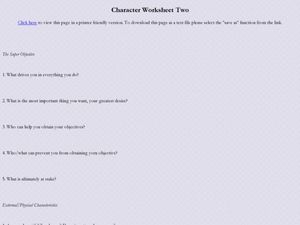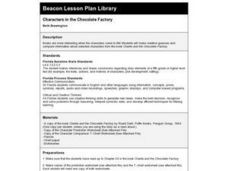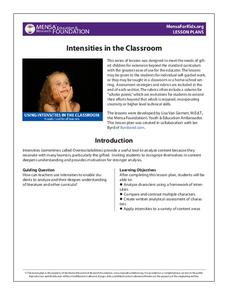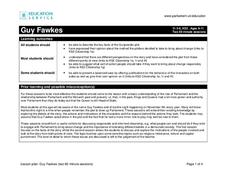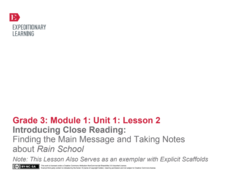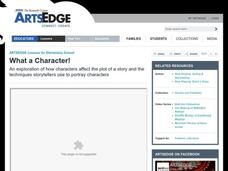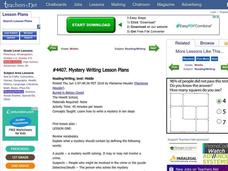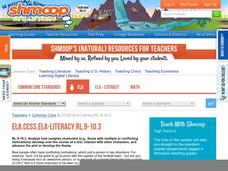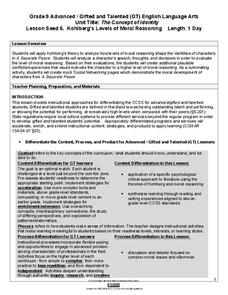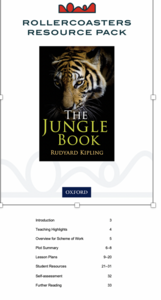Curated OER
Character Worksheet Two
In this character worksheet, students answer questions about themselves and about their motivators and external characteristics. Students answer 22 questions.
Curated OER
Characters in the Chocolate Factory
Students dress and act as selected characters from Roald Dahl's "Charlie and the Chocolate Factory". They identify each other and make predictions about the upcoming chapters based on their observations about the characters.
Curated OER
Using Inspiration Software to Explore Characters In Stories
Students identify characters, their qualities, and examples of their qualities and use Inspiration to organize them in a clear and understandable format. After a lecture/demo, students use the program on the next story by themselves.
EngageNY
Close Reading of Thank You, Mr. Falker: Identifying the Superpowers of Reading
Third graders read excepts from the story, Thank You, Mr. Falker in order to gain practice in understanding an unfamiliar story by focusing on the details. They use a worksheet, embedded in the plan, which directs them to certain...
MENSA Education & Research Foundation
Intensities in the Classroom
Everyone learns and experiences life differently. A set of lessons about character intensities encourages middle and high schoolers to analyze themselves, their peers, and characters from a book based on the five listed intensities:...
Curated OER
Guy Fawkes
Sixth graders access their prior knowledge of the job of Parliament and its relationship to the monarchy. For this Gunpowder Plot lesson, 6th graders research the Gunpowder Plot, summarize key story ideas, and role play the plot. They...
Curated OER
Helpful Animals and Compassionate Humans in Folklore
Students define elements of stories from around the world that include helpful animals. They explore animal character motivations and use graphic organizers to compare and contrast animal stories from different cultures.
EngageNY
Introducing Close Reading: Finding the Main Message and Taking Notes About Rain School
This second instructional activity in a larger unit is perfect for the beginning of the year because it explicitly teaches 3rd graders how to use close reading skills by identifying unfamiliar words, figuring out the gist, and defining...
Curated OER
What a Character!
Students look at the role of characters in a story. In this character lesson, students discuss how different types of characters change the plot of the story. They see how storytellers use their body, face, and voice to tell stories.
Curated OER
Saturday Market by Patricia Grossman
Readers make personal connections to Saturday Market by Patricia Grossman and answer comprehension questions while reading the book. Comparing and contrasting the different characters in a Venn diagram leads to a kinesthetic activity...
Curated OER
Who's Got Game? The Lion or the Mouse?
Discuss bullying, folk tales, and more using this resource. Learners read the story The Lion and the Mouse by Toni and Slade Morrison, engage in cause and effect activities, make predictions, and discuss bullying. This is a motivating...
Curated OER
Reading and Activity Suggestions for The Adventures of Tom Sawyer
Students learn about characterization techniques in The Adventures of Tom Sawyer. In this Adventures of Tom Sawyerlesson, students write a description of one character through the eyes of another character and identify scenes that give...
Curated OER
Creative Characterization
Students write a character description journal in which they take on the voice of one of the character's made-up friends or relatives. They write a sketch of that character from the friend or relatives' point of view.
Hawaiʻi State Department of Education
Sequence of Events
Are you in need of a new way to teach learners sequence of events and how to interpret a character's external motivations? Why not engage them in dramatic play? The class will use tableaux to convey the sequence of events in a familiar...
TED-Ed
Pixar: The Math Behind the Movies
When will we ever use this? A Pixar movie maker explains to students how math is used in the creation of animated films. The movie maker discusses the importance of coordinate planes, transformations and translations, and trigonometry.
Curated OER
Mystery Writing Lesson Plans
Introduce your class to the genre of mystery. Included is a vocabulary list, a rubric, and a sample mystery story called "Lethal Lesson." There are very limited directions on what to do with these resources, so you will need to plan some...
Shmoop
ELA.CCSS.ELA-Literacy.RL.9-10.3
Focus on complex characters with a instructional activity from a series that teaches individual skills from the Common Core. Specifically, this resource provides practice with standard RL.9-10.3. Get pupils thinking and talking about...
Hawaiʻi State Department of Education
Crow Boy
There is a difference between actions, motives, and the appearance of a character in a narrative text. Fourth graders explore character analysis through the dramatic arts. They create a series of movements, tableaus, and pantomimes to...
Curated OER
James and the Giant Peach Character Study
Every book has a few great characters, but James and the Giant Peach is the only one whose characters travel in a piece of fruit. The class creates T-charts for the main characters of the novel, while reading the book. They write actions...
Curated OER
Measure for Measure: Anticipation Guide
Be bold and never fearful! Tempt your scholars with an Anticipation Guide for Measure for Measure. Before reading Shakespeare’s problem play, class members label a series of statements as either true or false in their opinion. (It’s okay...
Maryland Department of Education
The Concept of Identity Lesson 6: Kohlberg's Levels of Moral Reasoning
How does our moral reasoning shape our identity? After a study of Kohlberg's Levels of Moral Reasoning, readers use Kohlberg's theories to analyze the speech, thoughts, and decisions of a character in A Separate Peace. They then create...
Shakespeare Globe Trust
Macbeth
Why do characters do what they do? Scholars use the resource to explore character motivation in Shakespeare's tragedy Macbeth. Additionally, they discover pictures, interviews, and videos from the Deutsche Bank production of the play.
Oxford University Press
The Jungle Book
Most every teacher dreams of a ready-to-teach and print book study. Well, here it is! The Jungle Book novel resource includes 12 complete lessons studying poetry, author's craft, themes, characters, and more. Scholars role play, research...
Novelinks
The House on Mango Street: Letters/Unsent Letters
Class members conclude their reading of The House on Mango Street with an assignment that asks them to compose letters to characters using their own voices or that of another character in Cisneros' story.


